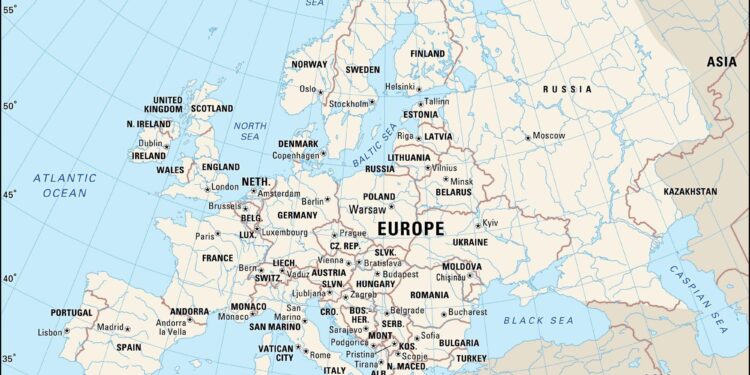Beware the Europe You Wish For: The Downsides and Dangers of Allied Independence
As Europe finds itself at a crossroads, the aspirations of national sovereignty and independence are resonating more than ever among member states. Recent political shifts have sparked fervent debates about the viability of a more autonomous Europe, yet a growing body of evidence suggests that the push for greater independence could come with significant risks. In this timely exploration, we delve into the intricate dynamics of allied independence, examining how the pursuit of self-determination might inadvertently isolate nations, erode collective security, and complicate relationships within an already fragmented continent. As leaders grapple with the implications of their choices, we must consider: is the Europe we envision truly in alignment with the realities of an increasingly interdependent world?
Navigating the Perils of European Autonomy in Foreign Policy
In the quest for a more independent foreign policy, European nations face significant risks that could undermine both their sovereignty and global standing. The desire for autonomy often clashes with the complex, interdependent nature of modern geopolitics, resulting in potential isolation from established alliances. Among the chief concerns are:
- Fragmentation of Strategy: Independent foreign policies may lead to disjointed initiatives, hindering collective European influence.
- Resource Allocation: Countries may struggle to prioritize and finance overlapping military and diplomatic efforts without cohesive coordination.
- Diminished Leverage: Without the backing of major allies like the United States, Europe risks losing negotiating power on the global stage.
Moreover, the push for autonomy could inadvertently empower adversarial nations keen on exploiting Europe’s divisions. Countries like China and Russia may seek to drive wedges between European states, exacerbating conflicts over trade and security. The resulting consequences could include:
- Increased Vulnerability: Nations may become more susceptible to coercion and manipulation from aggressive actors.
- Economic Challenges: Disparate approaches could damage trade relations and undermine collective bargaining in international markets.
- Loss of Credibility: Fragmentation can lead to inconsistent policies that erode trust among global partners.
The Economic Implications of Diminished Alliances on Global Stability
The decline of traditional alliances has far-reaching economic implications that threaten global stability. With countries drifting towards independence and prioritizing national interests, we are witnessing a shift in the geopolitical landscape that could lead to economic fragmentation. The erosion of multilateral frameworks limits cooperation on pressing issues such as trade, climate change, and security. This can result in a fragmented global economy characterized by increased barriers, uneven growth, and inflated prices due to reduced competition.
Key economic risks from diminished alliances include:
- Increased tariffs and trade barriers contributing to higher consumer costs.
- Reduced investment flows as countries become wary of geopolitical instability.
- Supply chain vulnerabilities arising from a lack of cooperative agreements.
- Currency instability due to isolated economic policies and lack of joint monetary strategy.
To illustrate the potential economic fallout, consider the following table, which demonstrates the projected trade volume changes among countries that pursue isolated policies versus maintaining robust alliances:
| Scenario | Projected Trade Volume (in billion $) |
|---|---|
| Robust Alliances | 2,000 |
| Isolated Policies | 1,200 |
Strategies for Balancing National Interests with Collective Security in Europe
Amid the shifting geopolitical landscape, nations in Europe must navigate the delicate equilibrium between asserting their sovereignty and committing to the principles of collective security. Strategic cooperation is essential, particularly in the face of rising tensions and asymmetric threats. To achieve this balance, European nations can adopt several effective approaches:
- Reinforcing NATO Cohesion: Strengthening alliances within NATO by enhancing joint military exercises and sharing intelligence can create a robust defense posture.
- Promoting Diplomatic Engagement: Engaging in continuous dialogue with potential adversaries can help mitigate misunderstandings and reduce the risk of conflict.
- Investing in Regional Defense Initiatives: Europe should prioritize investments in regional defense mechanisms, such as the European Defence Fund, to ensure that collective security efforts do not compromise national interests.
Additionally, fostering economic interdependencies can serve as a buffer against unilateralism. Economic partnerships can reinforce alliances, making it more difficult for nations to deviate from collective priorities. A few ways to encourage this approach include:
- Enhancing Trade Agreements: Structuring trade policies that benefit multiple nations can provide a foundation for stronger political alliances.
- Collaborative Research and Development: Investing in joint technological innovation projects can align national priorities with collective security goals.
- Building Energy Resilience: Increasing shared energy initiatives, like renewable projects, can reduce reliance on non-European sources while fostering unity among nations.
In Retrospect
In conclusion, while the call for greater independence among European nations may resonate with a desire for self-determination and local governance, it is crucial to remain vigilant about the potential pitfalls that accompany such movements. The allure of a fragmented Europe could usher in a host of economic, political, and social challenges that may outweigh the perceived benefits of autonomy. As nations grapple with the complex interplay of national interests and collective security, the lessons of history remind us that unity often proves more advantageous than division. Policymakers and citizens alike must weigh the romanticized vision of sovereignty against the realities of cooperation and interdependence. The path to a stable and prosperous Europe requires not just a wish for independence, but a thoughtful consideration of the implications it entails. As the debate unfolds, it is imperative to remain engaged and informed, ensuring that the future of Europe is one that embraces both its diverse identities and its shared destiny.














